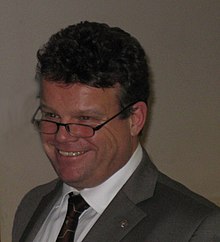
The University of Sheffield is a public research university in Sheffield, South Yorkshire, England. Its history traces back to the foundation of Sheffield Medical School in 1828, Firth College in 1879 and Sheffield Technical School in 1884. University College of Sheffield was subsequently formed by the amalgamation of the three institutions in 1897 and was granted a royal charter as University of Sheffield in 1905 by King Edward VII.

Sheffield Hallam University (SHU) is a public research university in Sheffield, South Yorkshire, England. The university is based on two sites; the City Campus is located in the city centre near Sheffield railway station, while the Collegiate Crescent Campus is about two miles away in the Broomhall Estate off Ecclesall Road in south-west Sheffield. A third campus at Brent Cross Town in the London Borough of Barnet is expected to open for the 2025–26 academic year.

Frederick Sydney Dainton, Baron Dainton, Kt, FRS, FRSE was a British academic chemist and university administrator.
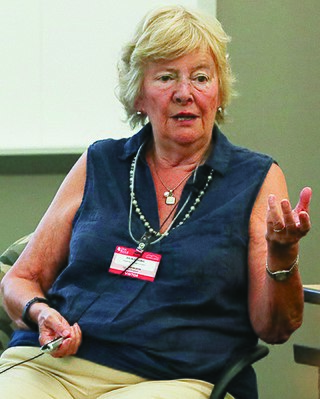
Dame Julia Stretton Higgins is a British polymer scientist. Since 1976 she has been based at the Department of Chemical Engineering at Imperial College London, where she is emeritus professor and senior research investigator.
Vernon Charles Gibson is a British scientist who served as Chief Scientific Adviser at the Ministry of Defence between 2012 and 2016. He was reappointed to the MoD CSA role in May 2023. He is visiting professor at Imperial College London and the University of Oxford, Honorary Professor at the University of Manchester. He delivered the Royal United Services Institute (RUSI) Prince Philip Lecture on Military Education in Nov 2023.
Tobin Jay Marks is an inorganic chemistry Professor, the Vladimir N. Ipatieff Professor of Catalytic Chemistry, Professor of Material Science and Engineering, Professor of Chemical and Biological Engineering, and Professor of Applied Physics at Northwestern University in Evanston, Illinois. Among the themes of his research are synthetic organo-f-element and early-transition metal organometallic chemistry, polymer chemistry, materials chemistry, homogeneous and heterogeneous catalysis, molecule-based photonic materials, superconductivity, metal-organic chemical vapor deposition, and biological aspects of transition metal chemistry.
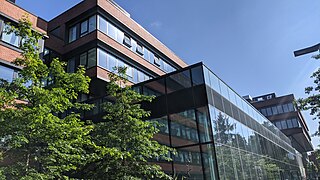
Manchester Institute of Innovation Research (MIoIR) is a research institute based in Alliance Manchester Business School at the University of Manchester, UK. MIoIR is a centre of excellence in the fields of innovation studies, technology management and innovation management, science policy, technology policy, innovation policy and regional innovation, the study of emerging technologies, responsible research and innovation, and research into socio-technical transitions with a focus on sustainability and digital transitions. MIoIR has also been known for research on service innovation and in particular the definition and early exploration of the concept of knowledge-intensive business services, through the work of scholars such as Ian Miles and Bruce Tether.
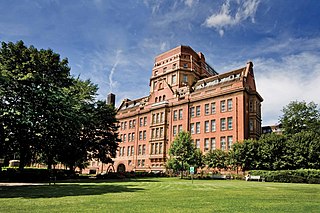
The Department of Materials, at the University of Manchester is an academic and research department specialising in Materials Science and Engineering and Fashion Business and Technology. It is the largest materials science and engineering department in Europe. This is reflected by an annual research income of around £7m, 60 academic staff, and a population of 150 research students and 60 postdoctoral research staff. The Department of Materials was formerly known as the School of Materials until a faculty-wide restructuring in 2019.
The Lancaster Environment Centre (LEC) in Lancaster, England, is an interdisciplinary centre for teaching, research and collaboration at Lancaster University, founded in 2007.

Dame Athene Margaret Donald is a British physicist. She is Professor Emerita of Experimental Physics at the University of Cambridge, and Master of Churchill College, Cambridge.

The Infinite Monkey Cage is a BBC Radio 4 comedy and popular science series. Hosted by physicist Brian Cox and comedian Robin Ince, The Independent described it as a "witty and irreverent look at the world according to science". Since 2013 the show has been accompanied by a podcast, published immediately after the initial radio broadcast, which features extended versions of most episodes. The programme won a Gold Award in the Best Speech Programme category at the 2011 Sony Radio Awards, and it won the best Radio Talk Show at the 2015 Rose d'Or awards. The name is a reference to the infinite monkey theorem.
The Grantham Institute – Climate Change and Environment is one of five global institutes at Imperial College London and one of three Grantham-sponsored centres in the UK. The institute was founded in 2007 with a £12m donation from the Grantham Foundation for the Protection of the Environment, an organisation set up by Hannelore and Jeremy Grantham.

Helen Storey, MBE, RDI, FRSA is a British artist and designer living and working in London. She is professor of fashion science at the University of the Arts, London and co-director of The Helen Storey Foundation.

Steven Peter Armes is a Professor of polymer chemistry and colloid chemistry at the University of Sheffield.

Christopher Aiden-Lee Jackson is a British geoscientist, science communicator and Director of Sustainable Geoscience at Jacobs Engineering Group. He was previously Professor of Sustainable Geoscience at the University of Manchester, and before that held the Equinor Chair of Basin Analysis at Imperial College, London. He is known for his work in geoscience, especially in the use of 3D seismic data to understand dynamic processes in sedimentary basins.
Matthew Johnson is a Reader in biochemistry at the University of Sheffield, England. He was the 2018 recipient of the Biochemical Society’s Colworth Medal.
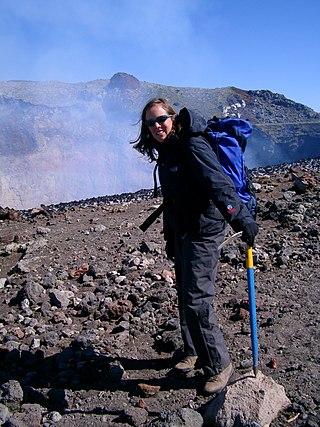
Tamsin Alice Mather is a British Professor of Earth Sciences at the Department of Earth Sciences, University of Oxford and a Fellow of University College, Oxford. She studies volcanic processes and their impacts on the Earth's environment and has appeared on the television and radio.
Janet Barlow is a Scottish scientist and professor of environmental physics at the University of Reading. She is an experimental physicist who has made significant contributions to our understanding of urban meteorology, with particular regards to weather forecasting, urban sustainability, indoor and outdoor air quality, building ventilation, and environmental wind engineering.

Matthew Cobb is a British zoologist and professor of zoology at the University of Manchester. He is known for his popular science books The Egg & Sperm Race: The Seventeenth-Century Scientists Who Unravelled the Secrets of Sex, Life and Growth; Life's Greatest Secret: The Race to Crack the Genetic Code; and The Idea of the Brain: A History. Cobb has appeared on BBC Radio 4's The Infinite Monkey Cage, The Life Scientific, and The Curious Cases of Rutherford & Fry, as well as on BBC Radio 3 and the BBC World Service.
Duncan Drummond Cameron is a British microbiologist and Professor of Environmental Sustainability at the University of Manchester. His research considers multiomics approaches to understand the interactions between soil microbes and plant nutrition. Alongside his research, Cameron works in science policy, and was involved with the 2015 United Nations Climate Change Conference.
